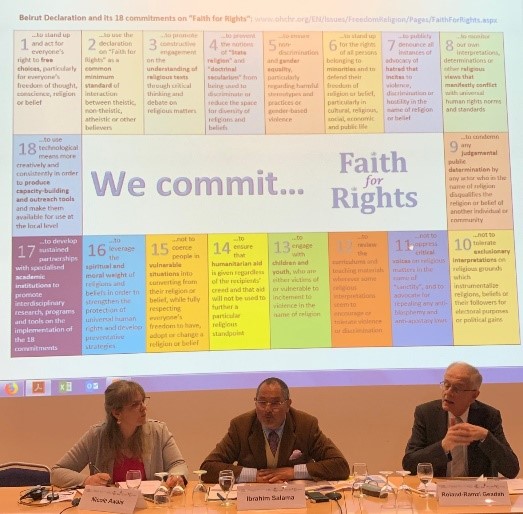Scenario C: A case to debate on economic and social rights
#Faith4Rights toolkit
| The newly elected Government of the State of “Charitana” prepared and conducted a large fundraising campaign to help the poor and needy of its citizens. The campaign coincided with a holy season of the year and intensely employed religious references of the predominant religion, Acharita, to which around 80% of the population belong. State official religious institutions contributed to this campaign and offered stewardships of the monitoring of managing funds emanating from solicited donations. The campaign included elaborated references to the benefits of giving and severe warning to those who do not give, arguing that the State’s name of “Charitana” for good reasons resembled the name of the main religion “Acharita”. Interviews with the poor and needy individuals were also used in this campaign, showing real manifestations of extreme poverty, hunger, illness and homelessness. Poor children addressed messages through these campaigns and were supported financially. |
Questions:
A sample of questions related to this case could include the following:
- Does this campaign provide a positive illustration of faith and economic/social rights mutually reinforcing each other?
- Is charity a good answer to combat poverty?
- What are the obstacles to development whose removal is rooted in faith teachings?
- How does faith view the difference between charity and empowerment?
- Are there tensions in practice between these two concepts?
- How could these be resolved?
- Is the participation of children strengthening the campaign or rather unduly instrumentalizing children, in light of the related human rights norms enshrined in the Convention on the Rights of the Child as well as commitments X and XIII?
A tip for facilitators
 Facilitators may wish to refer to the "Faith in Human Rights" Statement (2008): "9. The Universal Declaration of Human Rights demands meeting basic human needs. The abject and dehumanizing conditions of extreme poverty to which more than a billion people are currently subjected, must be decisively altered. The human destruction of the environment has to be stopped. […] 12. Humbled by the authority that is vested in the religions of the world and conscious of our shared responsibility to defend human rights, we fervently desire that this Statement will initiate a wider process, and will become a catalyst for transformation and change. In order to widen and deepen the support for human rights by religious communities we invite religious leaders around the world to endorse this Statement. We call upon believers everywhere to disseminate this Statement as widely as possible and act upon it."
Facilitators may wish to refer to the "Faith in Human Rights" Statement (2008): "9. The Universal Declaration of Human Rights demands meeting basic human needs. The abject and dehumanizing conditions of extreme poverty to which more than a billion people are currently subjected, must be decisively altered. The human destruction of the environment has to be stopped. […] 12. Humbled by the authority that is vested in the religions of the world and conscious of our shared responsibility to defend human rights, we fervently desire that this Statement will initiate a wider process, and will become a catalyst for transformation and change. In order to widen and deepen the support for human rights by religious communities we invite religious leaders around the world to endorse this Statement. We call upon believers everywhere to disseminate this Statement as widely as possible and act upon it."